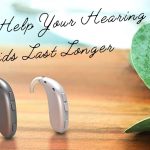Hearing aids are by far the most important thing we can do to maintain our best hearing health as we experience hearing loss. In fact, studies have shown time and again that wearing hearing aids not only improves our ability to communicate, but has wide-ranging positive effects on our overall health and well-being.
Untreated hearing loss tends to set off a cascade of negative effects that lead to a decrease in both social time and physical activity. It makes sense, doesn’t it? When we can’t hear well, conversation becomes less enjoyable, and even moving around in the world can become more difficult as we miss out on auditory cues. Almost without realizing it, we tend to spend less time doing the things that keep us socially connected and physically active.
Fortunately, hearing aids can offset the effects of hearing loss to keep our lifestyles intact, even as hearing loss progresses. Those who get hearing aids report overwhelming satisfaction with them, when asked after one year, and studies show that hearing aid wearers are more socially connected and physically active than those with untreated hearing loss.
One question that comes up frequently for new wearers is: How long will my new hearing aids last? For a few reasons, the answer tends to be about 4 to 6 years.
Sensitive Parts in an Inhospitable Environment
Hearing aids today are incredibly sophisticated instruments that incorporate a lot of miniaturized, sensitive components. At the same time as we ask them to provide crystal-clear sound quality for all of our waking hours, they have to live in the relatively inhospitable environments of our ear canals and/or behind our ears. Sweat, earwax, and other environmental elements come into contact with them and can eventually cause problems. Some people tend to have more issues with this than others, depending on everything from body chemistry to the climate in which they live.
Still, recent advancements in hearing aid technology have made them less susceptible to this kind of damage. The advent of rechargeable batteries has allowed them to be more sealed-off from moisture and debris, and most BTE (behind-the-ear) and RIC (receiver-in-canal) hearing aids today have an IP (ingress protection) rating of 68, the highest available. This means they are sealed off from dust and can withstand submersion in water for an extended time period. In the coming years, we may find that hearing aids are lasting longer than the typical 4–6 years we’ve come to expect.
Most hearing aids come with a warranty of 2–3 years. Repairs conducted while the hearing aids are under warranty are typically free, but once the warranty expires the repairs can become more expensive, depending on the issue.
Advancements in Technology
Another thing to consider is the rate at which hearing aid technology is developing. The hearing aids on the market right now are significantly better than the hearing aids being sold even just 4 years ago. Incredible advancements in computer technology have allowed motion sensors to be incorporated to make program adjustments automatic, while the basic functionality of those programs is also significantly better.
In the coming years we can expect to see even more advancements in the computers that drive the listening experience we get from our hearing aids, as well as improvements in battery technology that may allow for smaller sizes and longer periods of use without charging or replacement. Even further integration with smartphones is likely to see an increase in the similarity between hearing aids and “hearables,” which are smart devices that are similar to hearing aids but do not necessarily provide amplification to help with hearing loss. (Think of Apple AirPods.)
Because the technology is advancing so quickly, it will likely be that a pair of hearing aids purchased at this time will be worth replacing in 4–6 years simply because the new technology will be superior, even if they still function well. Think about how often we replace our smartphones and you can see a similarity with the way that the lifespan of a set of hearing aids tends to progress.
Hearing Aids with FitHearing
If you or a loved one is having issues hearing, make an appointment for a hearing test today. If hearing aids are recommended, our team can go over the options with you and find the pair of hearing aids that best meets your needs. Contact us at one of our convenient locations today!






